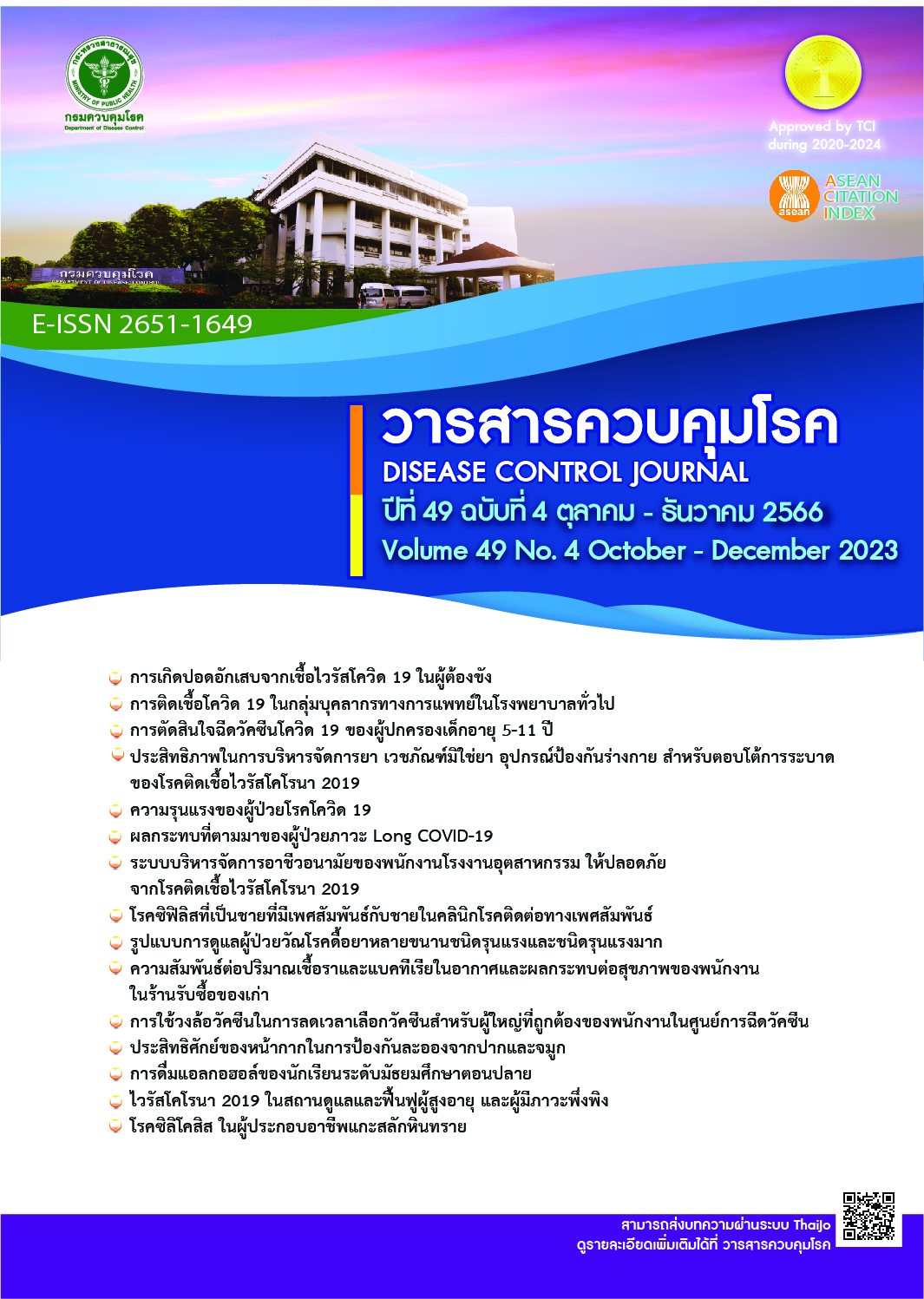Factors affecting drug, medical supplies, personal protective equipment efficiency management for COVID-19 response, Ministry of Public Health
DOI:
https://doi.org/10.14456/dcj.2023.59Keywords:
factor, efficiency, management, drug, medical supplies, personal protective equipment, COVID-19 infectionAbstract
This research aimed to study factors that affected drug, medical supplies, personal protective equipment efficiency management for COVID-19 response activities. This research aimed to analyze new interventions which could solve the current problems and determine approaches to developing the guidelines to support the next phase of pandemic. This study was qualitative research. Twenty participants from the Department of Disease Control (DDC), 12 Regional Offices of Disease Prevention and Control (ODPCs) across the country, and the Institute for Urban Disease Control and Prevention (IUDC) were selected as the representative of this study. Data were collected by using document review and analysis and in-depth interview. The results indicated that the establishment of the Emergency Operations Center (EOC) in both Department of Disease Control and Ministry of Public Health had increased coverage and access of medical supplies to target groups and reduced medical supplies shortages. The procurement process was found to be most effective and appropriate when complying with Article 79, Paragraph 2 under the Government Procurement and Supplies Management Act B.E. 2560 (2017). Medical supplies frequently facing shortages were medical face masks, N95 respirators, personal protective equipment (PPE), diagnostic materials for sample collection, and 70% alcohol gel. Supportive policies implemented by relevant stakeholders from inside and outside of the Ministry of Public Health, such as Thailand Food and Drug Administration (Thai FDA), Department of Internal Trade, Comptroller General’s Department, Ministry of Finance, and Customs Department, contributed significantly to increased efficiency of the procurement processes. The budget was continuously allocated through normal annual budget appropriations in the first phase and emergency budget in the next phase of pandemic. The budget allocation should be continued until pandemic is over or when COVID-19 has become endemic disease. Both Viral Pneumonia and Co-Ward databases, maintained by Department of Disease Control and Ministry of Public Health, respectively, could increase effective inventory management in support of COVID-19 response efforts. Conclusion: The existence of functional EOCs, supportive policies for successful operations, sufficient funding, and efficient, real-time information system were the important factors affecting drug, medical supplies, personal protective equipment efficiency management for COVID-19 response activities implemented by Ministry of Public Health.
Downloads
References
Techathawat S. Guidelines for managing supplies and materials in normal and public health emergency. Bangkok: Printing Agriculture Cooperatives of Thailand; 2011. (in Thai)
Department of Disease Control (TH). Management of public health emergencies; Incident Command and Emergency Operation Center for Ministry of Public Health Executives. Nonthaburi: Department of Disease Control; 2017. (in Thai)
Department of Disease Control (TH). Department of Disease Control Order No.9/2020 on the appointment of a working group of the Emergency Operation Center in case of Viral Pneumonia. Nonthaburi: Department of Disease Control; 2020. (in Thai)
Ministry of Public Health (TH). Ministry of Public Health Order No.2/2020 on the appointment of a working group of the Emergency Operation Center in case of COVID-19. Nonthaburi: Ministry of Public Health; 2020. (in Thai)
Ministry of Finance (TH). Government Procurement and Supplies Management Act B.E. 2560. Bangkok: Ministry of Finance; 2017. (in Thai)
Ministry of Finance (TH). Regulation of Ministry of Finance on Government Procurement and Supplies Management 2017. Bangkok: Ministry of Finance; 2017. (in Thai)
Food and Drug Administration (TH). Announcement of Food and Drug Administration on documents for submitting certificates for importing medical devices related to Coronavirus Disease 2019. Nonthaburi: Food and Drug Administration; 2020. (in Thai)
Ministry of Finance (TH). Announcement of Ministry of Finance on customs duty exemption for imported items for treatment, diagnostic or prevention of Coronavirus Disease 2019. Bangkok: Ministry of Finance; 2020. (in Thai)
Thai Customs. Announcement of Thai Customs on regulations, procedures and conditions of customs procedures for exemption of customs duty on imported items for treatment, diagnostic or prevention of Coronavirus Disease 2019. Bangkok: Thai Customs; 2021. (in Thai)
National Academy of Medicine. Health product manufacturers and innovators COVID-19 impact assessment: Lessons learned and compelling needs. Washington DC: National Academy of Medicine; 2022.
Downloads
Published
How to Cite
Issue
Section
License
Copyright (c) 2023 Disease Control Journal

This work is licensed under a Creative Commons Attribution-NonCommercial-NoDerivatives 4.0 International License.
Articles published in the Disease Control Journal are considered as academic work, research or analysis of the personal opinion of the authors, not the opinion of the Thailand Department of Disease Control or editorial team. The authors must be responsible for their articles.






